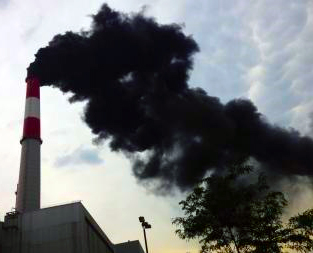Hawai`i Legislative and PUC Reforms Needed to Correct Power Plant Pollution, Climate & Community Impacts
The controversy surrounding the proposed Hu Honua biomass-to-electricity power plant in Pepeekeo and at the former site of Hilo Coast’s coal-fired electricity power plant could result in new laws linking power plants to their environmental, climate, and social consequences.
The first issue to be decided is which law should be changed?
 There are two ways of determining what should trigger an environmental review in the establishment of a new or fundamental changes to an exiting power generation facility. One is bottom-up, by specifically identifying project types. The second is top down, to include everything and then remove project types that have small impacts. Hawai`i uses a mix of the two types and applies them sometimes in odd ways. In addition, the application of laws is not always equitable.
There are two ways of determining what should trigger an environmental review in the establishment of a new or fundamental changes to an exiting power generation facility. One is bottom-up, by specifically identifying project types. The second is top down, to include everything and then remove project types that have small impacts. Hawai`i uses a mix of the two types and applies them sometimes in odd ways. In addition, the application of laws is not always equitable.
The environmental review process, HRS 343, is required for any project that uses “state or county lands or the use of state or county funds,” or is in the conservation district, shoreline management area, or Waikiki. By contrast, a helipad only triggers an environmental review if the helicopter flies over specific types of land. A wastewater treatment unit requires an environmental review if serves 50 small houses but not 49 mansions.
The environmental review process was not required for projects built with private money on agriculturally-zoned land. The naphtha-burning fossil fuel-powered generation station in Honoka`a escaped review. The law was modified so that if it were built today, it would require environmental review. But a larger facility built with private money on agriculturally-zoned land such as Hu Honua still does not trigger environmental review.
The PUC application and permission to process governing the Hu Honua biomass (burn trees for electricity) is an example of what’s wrong with the state’s current processes governing the permitting process of power generation facilities and fulfilling Hawaii’s goal to a clean energy economy by 2045. Reforming the current permit review process can take several forms, but future reforms must fully consider the need for an environmental review. This reform of the current review process would include environmental, climate, and social consequences, and would have one of several triggers: all large power plants, all power plants with injection wells, all power plants that have large greenhouse gas emissions, all power plants that burn trees, all coastal infrastructure facilities, etc.
Contrary to some people`s public belief, we do not have uniform federal laws. Federal appeal courts can interpret federal law in different ways, and until the Supreme Court speaks, the states within each federal appeals court jurisdiction have to follow the relevant interpretation.
The Clean Water Act requires permits for discharging pollution, including heat, into the ocean. Some appeals courts assert that the pipe must go into the ocean in order to trigger regulations. The Ninth Circuit Court of Appeals asserts that if a conduit between the pipe and the ocean exists, that is sufficient. This legal interpretation of the Clean Water Act could have local implications, as exemplified by Hu Honua plant operations which has already discharged contaminated water into the area reef system and ocean, as acknowledge by DoH.
Maui County is challenging that interpretation. Having lost in federal court and the appeals court, the county has asked the U.S. Supreme Court to hear the case. The county has spent nearly twice as much money on the appeal than it needed to come into compliance.
State law could be passed that imposing state regulations of all ocean conduits.
The definition of renewable energy used by the Public Utilities Commission has drastically changed several times since the Legislature first defined it in 2001.
The Legislature could assert that biomass generators which burn trash, trees and other combustible materials for power do not qualify as legitimate energy sources for power generation due to their smokestack emissions contributing to global warming and as a source of local area air pollution. A reform bill addressing this loophole in the current RPS 2045 law was introduced in House in 2016, but failed to clear its committee for consideration by the legislature. Any reform legislation would have to pass the State Legislature.
In general, in broad stereotypical terms, multi-issue groups know that any given legislator will support some of their bills, oppose others, and be indifferent to still others. The art of persuasion occurs.
In general, in broad terms, some stereotypical single-issue groups get frustrated, especially when legislators prefer to sort things out behind closed doors. This can lead to an advocacy group taking a no-prisoners approach, which universally fails. Some single-issue groups making it personal and aggressively attack people, stressing a vinegar instead of honey approach, which often backfires in big ways, and poisons the well for years to come.
The State Legislature`s 2019 session opens on January 16th. The seven chairs of energy, environment, and transportation are:
- Nicole Lowen, House Committee on Energy & Environmental Protection
- Mike Gabbard, Senate Committee on Agriculture and Environment
- Glenn Wakai, Senate Committee on Energy, Economic Development, and Tourism
- Roy Takumi, House Committee on Consumer Protection & Commerce
- Rosalyn Baker, Senate Committee on Commerce, Consumer Protection, and Health
- Henry Aquino, House Committee on Transportation
- Lorraine Inouye, Senate Committee on Transportation
Two Big island and knowledgeable state legislators on energy policy are Senator Lorraine Inouye and Representative Nicole Lowen.
Senator Inouye is Senate Majority Whip and Chair of the Senate Committee on Transportation. She sits on the Hawai`i Climate Change Mitigation and Adaptation Commission, is a champion for energy storage tax credits, was chair of the Senate Energy Committee, and completed the University of Idaho`s Legislative Energy Horizon Institute’s (LEHI) course in energy policy, a 60-hour energy immersion executive course with the University of Idaho.
Representative Nicole Lowen is House Majority Whip and Chair of the House Committee on Energy & Environmental Protection. Lowen served as a Legislative Liaison for the University of Hawaii Environmental Center, as a Policy Researcher, for the University of Hawaii Department of Urban and Regional Planning, and as an Executive Committee Member of the Sierra Club Hawaii Chapter.
Now is the time to determine which approach to take. One can either write a detailed bill or submit an outline to a Legislator. In either case, the proposed language will be reviewed by legislative analysts to put in into the correct legal structure.
Seeking to persuade Legislators is far more likely to succeed than attacking them.



